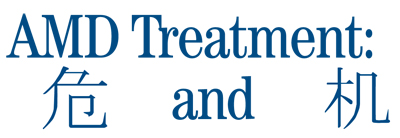 |
With the approval of Lucentis for treatment of neovascularization in AMD, retina specialists have an array of treatment options today that was unimagined just a few years ago. Along with Macugen, PDT and triamcinolone, the addition of another FDA-approved anti-VEGF therapy makes this one of the most rapidly changing areas in eye care.
Unfortunately, the availability of Avastin for off-label use presents retina specialists with something of an ethical challenge. (Insert mandatory cliche about the Chinese character for crisis containing both opportunity and danger. Yes, I realize the whole thing is a fallacy; it's mandatory nonetheless.) Such an environment is fraught with opportunity, responsibility and, of course, uncertainty.
I won't presume to advise retina specialists about the considerations in choosing a treatment, from cost to evidence of safety and effectiveness to side effect profiles. The ones I know wouldn't need it, and they'll get it where they should anyway, from their peers, in their journals. What is my business is that—especially in such a volatile environment—most of ophthalmology will be getting much of its information about the evolving variety of uses that are sure to be tested from publications just like this one, the unfortunately tagged "throwaways." (Insert mandatory rant: Now that we have this electronic storage bin called the World Wide Web, unless you're the librarian at Bascom Palmer, everything is a throwaway. The only distinctions are how long you hold it before you throw it away and how much of it you actually read before you throw it away.)
The information is going to be coming fast and furious and every ophthalmologist is going to be duty-bound to keep up with it. The reality is that the gold standard—placebo-controlled, randomized clinical trials comparing these options, and new ones yet to appear—is not going to be economically or even ethically feasible.
Peer-reviewed journals still have a vital part in this but the fact is, even with the occasional special advance publication, this has the look of a clinical situation that will be changing too fast for them to keep up. So along with the responsibility that all of you bear, let's be sure that all of us, starting right here, bear ours as well. You'll see more opinions in the non-peer-reviewed publications than you can ever use. Opinions, we know how to deal with. But if you see something presented as trial data, let's see the methodology, the number of patients, the commercial support, and most importantly, all of the outcomes.
This a very exciting time for you and your AMD patients. Let's be careful out there.



